Celebrating Sunshine Week with Some EPIC Open Government Wins
March 16, 2023 |

On Freedom of Information Day, which coincides with the birthday of James Madison, principal drafter of the U.S. Constitution and a key advocate for open government, EPIC is highlighting some open government wins from the past year. EPIC publishes a Freedom of Information Act (FOIA) gallery featuring our open government successes each year during Sunshine Week, a week promoting open government and transparency.
The Importance of FOIA & Why Sunshine the Best Disinfectant
The Freedom of Information Act and other state sunshine laws establish a legal right for individuals to obtain records in the possession of government agencies. Open records laws are critical for the functioning of democratic government because they help ensure that the public is fully informed about matters of public concern. Open government laws have often helped uncover fraud, waste, and abuse in federal, state, and local government.
A hallmark of many of the surveillance programs and tools adopted by government agencies is a disregard for public accountability. As the government seeks to expand its power to collect and exploit information about individuals, it increasingly hides that power behind a wall of secrecy. Congress has long recognized this tendency in the Executive Branch and sought to limit government secrecy by creating legal obligations of openness under the FOIA and the Privacy Act of 1974. EPIC has used these open government laws—along with the Federal Advisory Committee Act, the E-Government Act of 2002, and state open government laws—to enable public oversight of key government activities.
EPIC’s Recent Open Government Highlights
EPIC’s open government work over the past year has resulted in disclosure of critical information about the activities of state and federal agencies. Through amicus briefs, public comments, and FOIA requests, we have been shaping public policy and court precedent that enables greater transparency and government oversight.
EPIC Urged Administrative Conference to Recommend Sweeping Open Government Reforms
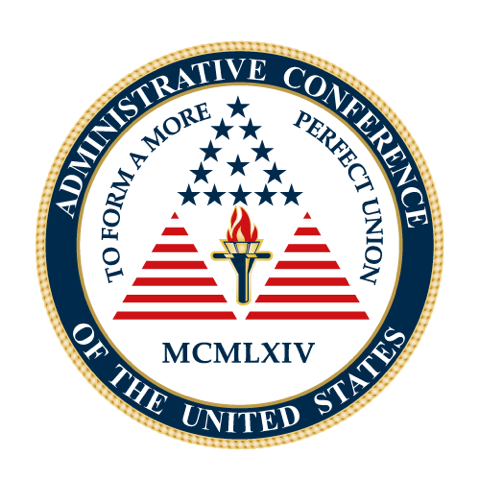
In July 2022, EPIC submitted comments to the Administrative Conference of the United States (ACUS) urging the agency to endorse numerous fixes to the Freedom of Information Act, E-Government Act of 2002, and Federal Advisory Committee Act that would require federal agencies to disclose more records and make those records easier to access. ACUS is an independent federal agency focused on improving federal agency processes and procedures.
EPIC specifically pushed ACUS to adopt a broad interpretation of what it means to be “agency legal materials” that is consistent with the purpose of federal open records laws. In its comments, EPIC highlighted three main challenges in accessing agency legal materials: (1) agencies’ failure to produce documents in a timely manner; (2) agencies’ lack of resources to process FOIA requests; and (3) agencies’ overuse of FOIA exemptions and failure to properly scope searches. EPIC also identified key types of documents that agencies should release for public knowledge on a regular basis, including OLC legal opinions, privacy threshold analyses, standard operating procedure documents, and memoranda of agreement or understanding. EPIC also recommended several amendments to relevant open government statutes, urged greater proactive disclosure, and highlighted some best practices for the disclosure of records on agency websites.
EPIC Investigated Screening and Scoring Algorithms and Published Screened & Scored in D.C.
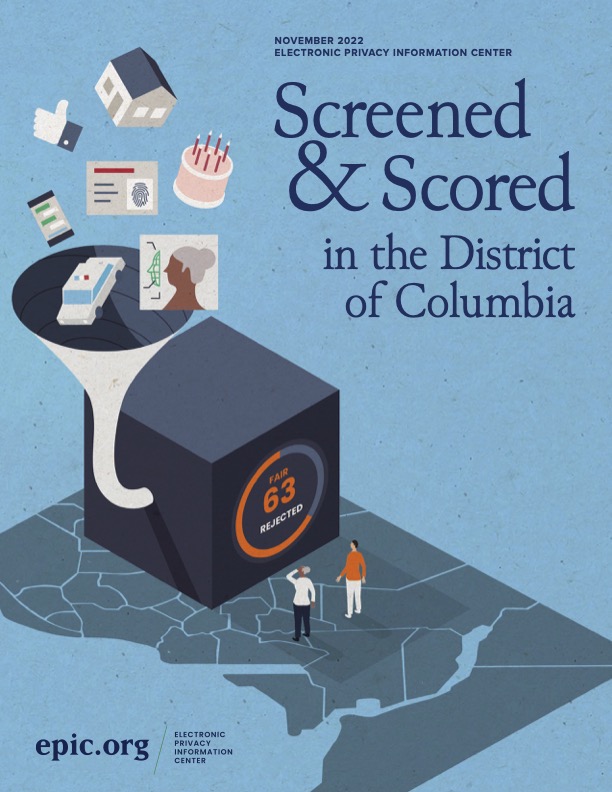
EPIC, along with then Scholar-in-Residence Virginia Eubanks, spent over a year investigating the D.C. government’s use of automated decision making systems. This research culminated in the release of Screened & Scored in D.C., a report that sheds light into the many uses of automated decision making systems within the District as well as the problems associated them. The report also includes policy recommendations and resources for residents affected by these systems. EPIC found 29 automated decision-making systems used by 20 D.C. agencies and compiled the information into a comprehensive table both within the report and online. EPIC also published all of the FOIA documents we received. Prior to the report’s release, EPIC hosted a panel about automated decision-making systems throughout D.C. from experts at Upturn, the Center for Law and Social Policy (CLASP), and the National Fair Housing Alliance.
Understanding how the government uses algorithms and promoting algorithmic transparency also means supporting other advocates on the ground who are fighting to increase transparency within their state and local governments—and celebrating their wins. Last year, Virginia interviewed Legal Aid of Arkansas about its legal victory against Arkansas’s Division of Workforce Services and what the decision means for unemployed workers and algorithmic transparency. In Arkansas Division of Workforce Services v. Legal Aid of Arkansas, the Arkansas Supreme Court found that the agency could not hide crucial information about its unemployment fraud systems from the public. The attorneys at Legal Aid of Arkansas said that “[a]ll kinds of sectors—civil society, Legal Aid advocates, community organizers, benefits recipients, journalists, and policy organizations—have to be prepared for legislative fights around FOIA” because it is easy to image state legislatures responding to legal victories like theirs by creating new FOIA exemptions.
D.C. Circuit Court of Appeals Agreed with EPIC and EFF that the Government Cannot Hide Lethal Injection Company’s Name Based on FOIA Exemption 4
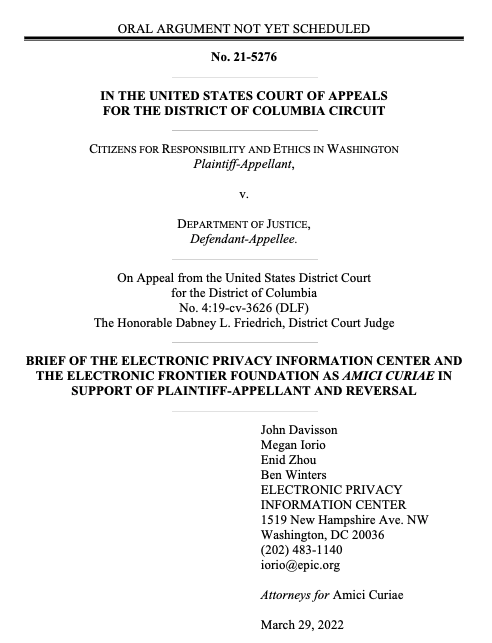
In February 2023, the D.C. Circuit Court of Appeals ruled in Citizens for Responsibility and Ethics in Washington (CREW) v. Department of Justice that the Bureau of Prisons could not hide the identity of the private companies supplying the government with lethal injection drugs used for executions. EPIC and the EFF had filed an amicus brief supporting the plaintiff CREW, a watchdog group. In the case, CREW filed a FOIA request to learn more about the government’s purchasing of lethal injection drugs, but the Bureau of Prisons withheld contractor identity based on FOIA Exemption 4, which protects confidential commercial information.
EPIC and EFF explained that the case was important because federal agencies increasingly rely on private companies to develop decision-making, surveillance, and identity verification tools that impact individuals’ fundamental rights. The identity of those companies is important for the public and watchdog groups like EPIC and EFF to conduct surveillance oversight and other transparency work related to the government’s use of technology. EPIC and EFF explained that a contractor’s name is not commercial information because it does not directly relate to the contractor’s ongoing commercial activities. Instead, it is crucial public information relating to how the government functions. The D.C. Circuit agreed, writing, “[T]he commercial consequences of disclosure are not on their own sufficient to bring confidential information within the protection of Exemption 4.”
The amicus brief also described how EPIC and EFF use contractor names to link information about vendors across jurisdictions and other sources, track the proliferation of a certain company’s technology, and find agencies using tools developed by companies with bad privacy track records. The case was remanded to the lower court to re-evaluate what information must be produced in light of the D.C. Circuit’s ruling and further factual development.
Appeals Court Ruled Livestreaming a Traffic Stop is Protected First Amendment Speech
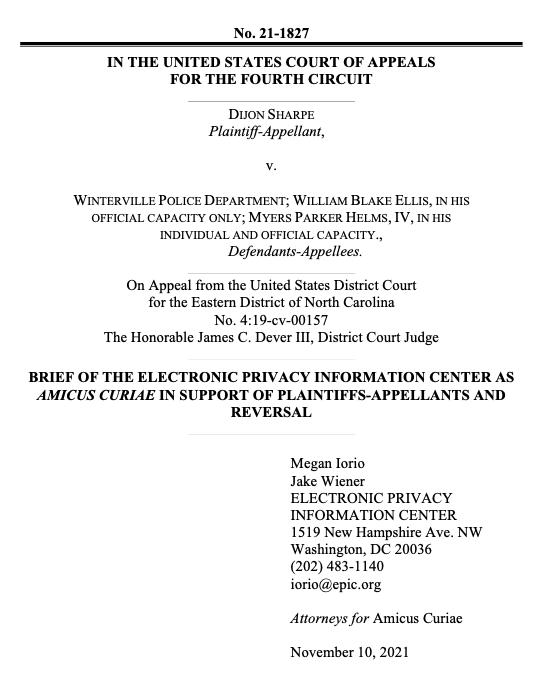
In February 2023, the Fourth Circuit ruled in Sharpe v. Winterville Police Department that the police cannot ban passengers in a traffic stop from livestreaming based on vague concerns for officer safety. In recognizing that livestreaming a traffic stop is protected under the First Amendment, the decision helps ensure that people can continue to conduct oversight over police activity and keep the police accountable for their actions.
In 2021, EPIC filed an amicus brief supporting plaintiff Dijon Sharpe and others’ right to livestream their public interactions with police. Sharpe sued the Winterville Police Department after an officer forcibly grabbed his phone and threatened him with jailtime for livestreaming his encounter with police as a passenger in a pulled-over car on Facebook Live. The district court agreed with the police and dismissed the case, finding that passengers do not have a First Amendment right to livestream traffic stops. But the Fourth Circuit reversed the district court decision.
EPIC’s amicus brief described how livestreaming is the newest method of the long-running First-Amendment-protected practice of “copwatching.” Copwatching is an activity in which members of overpoliced communities peaceably watch citizen-police encounters “to hold police accountable for misconduct and to increase the safety of those policed.” EPIC also explained that stopping passengers from livestreaming traffic stops serves no legitimate purpose because police “conduct stops on streets and highways where hundreds of people may pass during the course of a stop” and where “[c]opwatching groups, journalists, and other bystanders can communicate essentially the same information as a passenger in a traffic stop.”
EPIC is Digging Deeper to Understand Public Benefits Technology
As part of a project on public benefits technology, Equal Justice Works Fellow Grant Fergusson has been submitting open records requests across several states for information about automated systems in public benefits programs. EPIC has already received over 9,000 documents about these systems across eleven states. We are reviewing the documents and submitting more state open records requests so we can continue to build resources and expand the public’s understanding of the benefits tech procurement landscape. These records include information about procurement budgeting decisions, technical specifications, and various agency support documents.
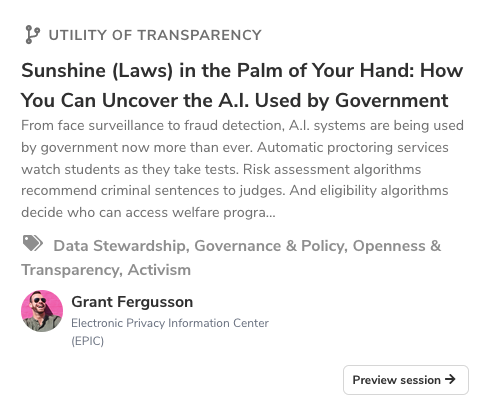
Grant is also giving a lightning talk at Mozilla Festival next week about how anyone can file FOIA requests like those used in EPIC’s Screened & Scored in D.C. report to reveal the breadth of government’s use of AI systems. Tune in to hear more!

Support Our Work
EPIC's work is funded by the support of individuals like you, who allow us to continue to protect privacy, open government, and democratic values in the information age.
Donate